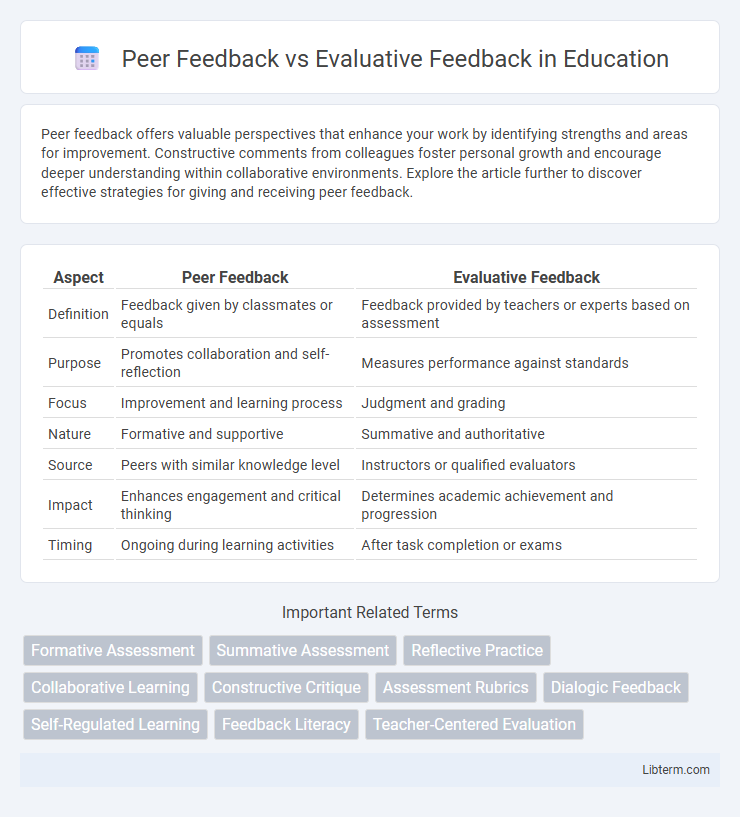Peer feedback offers valuable perspectives that enhance your work by identifying strengths and areas for improvement. Constructive comments from colleagues foster personal growth and encourage deeper understanding within collaborative environments. Explore the article further to discover effective strategies for giving and receiving peer feedback.
Table of Comparison
| Aspect | Peer Feedback | Evaluative Feedback |
|---|---|---|
| Definition | Feedback given by classmates or equals | Feedback provided by teachers or experts based on assessment |
| Purpose | Promotes collaboration and self-reflection | Measures performance against standards |
| Focus | Improvement and learning process | Judgment and grading |
| Nature | Formative and supportive | Summative and authoritative |
| Source | Peers with similar knowledge level | Instructors or qualified evaluators |
| Impact | Enhances engagement and critical thinking | Determines academic achievement and progression |
| Timing | Ongoing during learning activities | After task completion or exams |
Understanding Peer Feedback and Evaluative Feedback
Peer feedback involves collaborative, constructive comments aimed at improving a peer's work through mutual understanding and shared learning experiences. Evaluative feedback provides judgment-based assessments, often from instructors or supervisors, focusing on measuring performance against established criteria or standards. Understanding the distinction highlights that peer feedback fosters growth through dialogue, while evaluative feedback supports accountability and formal grading.
Defining Key Differences Between Feedback Types
Peer feedback involves constructive comments and suggestions provided by colleagues or equals to foster growth and improvement, emphasizing collaboration and shared learning. Evaluative feedback is judgment-based, often delivered by supervisors or experts, focusing on assessing performance against established standards or criteria. The key difference lies in peer feedback prioritizing developmental support, while evaluative feedback centers on performance appraisal and accountability.
Goals and Purposes of Peer Feedback
Peer feedback aims to foster collaborative learning by encouraging students to critically evaluate each other's work, promoting self-reflection and deeper understanding of the subject matter. It focuses on constructive suggestions that help improve specific skills and knowledge rather than assigning grades or judgments. The primary goal of peer feedback is to develop critical thinking, communication skills, and a growth mindset among learners.
Objectives and Role of Evaluative Feedback
Evaluative feedback primarily aims to assess performance against established standards, providing clear judgments to guide improvement and decision-making. Its role is to offer objective, criteria-based information that helps learners understand their progress and areas needing enhancement. This form of feedback supports accountability and motivates goal-oriented development by delivering precise and actionable evaluations.
Benefits of Peer Feedback in Learning Environments
Peer feedback fosters active learning by encouraging students to engage critically with each other's work, which enhances comprehension and retention. It promotes collaborative skills and creates a supportive learning community that motivates improvement without the pressure of grades. This form of feedback also develops self-assessment abilities, enabling learners to identify strengths and areas for growth independently.
Advantages of Evaluative Feedback for Assessment
Evaluative feedback provides clear, objective criteria that enhance the reliability and validity of assessments, allowing educators to measure student performance against established standards effectively. This type of feedback facilitates targeted improvement by identifying specific strengths and weaknesses, thereby guiding learners toward mastery of the subject matter. Evaluative feedback also supports accountability in educational settings by offering consistent, measurable data that can inform grading decisions and curriculum adjustments.
Challenges and Limitations of Peer Feedback
Peer feedback faces challenges such as potential bias, varying levels of reviewer expertise, and lack of standardized criteria, which can compromise the reliability and validity of the feedback. Students may struggle with providing constructive criticism due to limited assessment skills or fear of harming peer relationships. Furthermore, the subjective nature of peer evaluations can lead to inconsistencies and difficulties in accurately measuring performance compared to traditional evaluative feedback from instructors.
Common Drawbacks of Evaluative Feedback
Evaluative feedback often emphasizes judgment and grading, which can lead to increased anxiety and reduced motivation among learners. It tends to create a performance-oriented mindset, discouraging risk-taking and creative problem-solving. This type of feedback may also fail to provide actionable insights, limiting opportunities for growth and improvement.
Best Practices for Integrating Both Feedback Types
Integrating peer feedback and evaluative feedback effectively enhances learning by combining formative insights with summative assessments. Best practices include establishing clear criteria to guide peers in providing constructive, specific comments while ensuring evaluative feedback remains objective and aligned with learning outcomes. Encouraging iterative feedback cycles where peers review revisions before receiving final evaluations fosters deeper engagement and continuous improvement.
Choosing the Right Feedback Approach for Your Needs
Peer feedback fosters collaborative learning by encouraging constructive dialogue and diverse perspectives, ideal for developmental goals and skill enhancement. Evaluative feedback provides authoritative assessment based on predefined criteria, making it suitable for grading, performance reviews, or high-stakes decisions. Selecting the right feedback approach depends on whether the priority is growth-oriented improvement or objective performance measurement.
Peer Feedback Infographic

 libterm.com
libterm.com